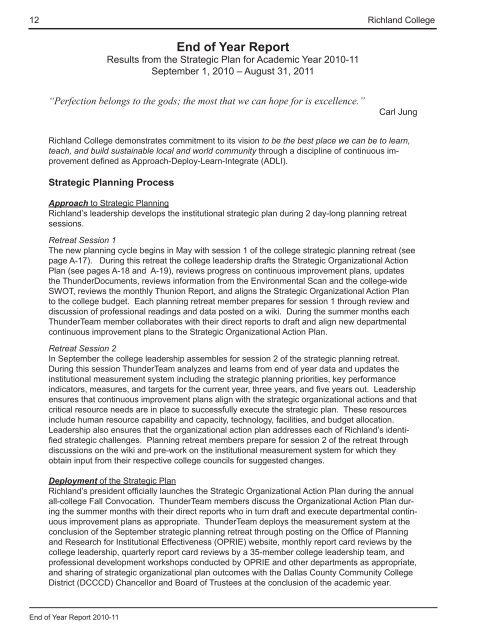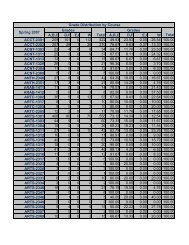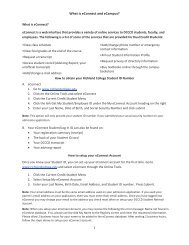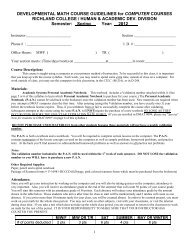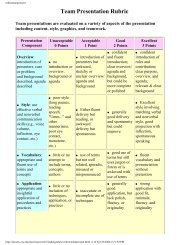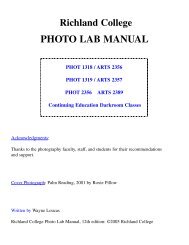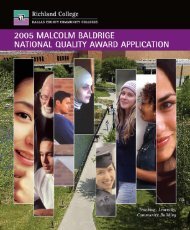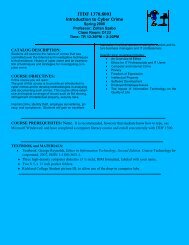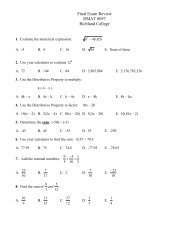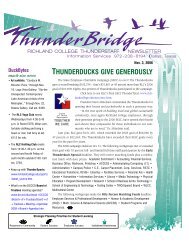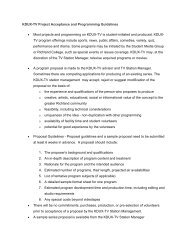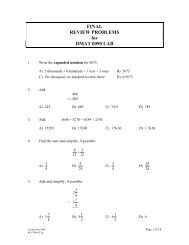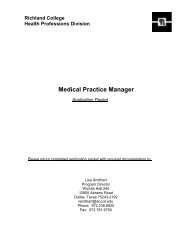End of Year Report - Richland College
End of Year Report - Richland College
End of Year Report - Richland College
You also want an ePaper? Increase the reach of your titles
YUMPU automatically turns print PDFs into web optimized ePapers that Google loves.
12<br />
Strategic Planning Process<br />
<strong>Richland</strong> <strong>College</strong><br />
<strong>End</strong> <strong>of</strong> <strong>Year</strong> <strong>Report</strong><br />
Results from the Strategic Plan for Academic <strong>Year</strong> 2010-11<br />
September 1, 2010 – August 31, 2011<br />
“Perfection belongs to the gods; the most that we can hope for is excellence.”<br />
Carl Jung<br />
<strong>Richland</strong> <strong>College</strong> demonstrates commitment to its vision to be the best place we can be to learn,<br />
teach, and build sustainable local and world community through a discipline <strong>of</strong> continuous improvement<br />
defined as Approach-Deploy-Learn-Integrate (ADLI).<br />
Strategic Planning Process<br />
Approach to Strategic Planning<br />
<strong>Richland</strong>’s leadership develops the institutional strategic plan during 2 day-long planning retreat<br />
sessions.<br />
Retreat Session 1<br />
The new planning cycle begins in May with session 1 <strong>of</strong> the college strategic planning retreat (see<br />
page A-17). During this retreat the college leadership drafts the Strategic Organizational Action<br />
Plan (see pages A-18 and A-19), reviews progress on continuous improvement plans, updates<br />
the ThunderDocuments, reviews information from the Environmental Scan and the college-wide<br />
SWOT, reviews the monthly Thunion <strong>Report</strong>, and aligns the Strategic Organizational Action Plan<br />
to the college budget. Each planning retreat member prepares for session 1 through review and<br />
discussion <strong>of</strong> pr<strong>of</strong>essional readings and data posted on a wiki. During the summer months each<br />
ThunderTeam member collaborates with their direct reports to draft and align new departmental<br />
continuous improvement plans to the Strategic Organizational Action Plan.<br />
Retreat Session 2<br />
In September the college leadership assembles for session 2 <strong>of</strong> the strategic planning retreat.<br />
During this session ThunderTeam analyzes and learns from end <strong>of</strong> year data and updates the<br />
institutional measurement system including the strategic planning priorities, key performance<br />
indicators, measures, and targets for the current year, three years, and five years out. Leadership<br />
ensures that continuous improvement plans align with the strategic organizational actions and that<br />
critical resource needs are in place to successfully execute the strategic plan. These resources<br />
include human resource capability and capacity, technology, facilities, and budget allocation.<br />
Leadership also ensures that the organizational action plan addresses each <strong>of</strong> <strong>Richland</strong>’s identified<br />
strategic challenges. Planning retreat members prepare for session 2 <strong>of</strong> the retreat through<br />
discussions on the wiki and pre-work on the institutional measurement system for which they<br />
obtain input from their respective college councils for suggested changes.<br />
Deployment <strong>of</strong> the Strategic Plan<br />
<strong>Richland</strong>’s president <strong>of</strong>ficially launches the Strategic Organizational Action Plan during the annual<br />
all-college Fall Convocation. ThunderTeam members discuss the Organizational Action Plan during<br />
the summer months with their direct reports who in turn draft and execute departmental continuous<br />
improvement plans as appropriate. ThunderTeam deploys the measurement system at the<br />
conclusion <strong>of</strong> the September strategic planning retreat through posting on the Office <strong>of</strong> Planning<br />
and Research for Institutional Effectiveness (OPRIE) website, monthly report card reviews by the<br />
college leadership, quarterly report card reviews by a 35-member college leadership team, and<br />
pr<strong>of</strong>essional development workshops conducted by OPRIE and other departments as appropriate,<br />
and sharing <strong>of</strong> strategic organizational plan outcomes with the Dallas County Community <strong>College</strong><br />
District (DCCCD) Chancellor and Board <strong>of</strong> Trustees at the conclusion <strong>of</strong> the academic year.<br />
<strong>End</strong> <strong>of</strong> <strong>Year</strong> <strong>Report</strong> 2010-11


